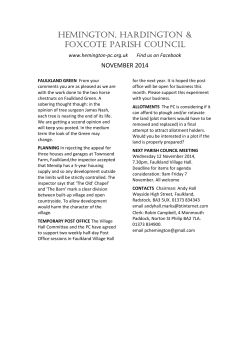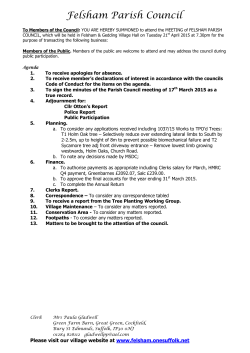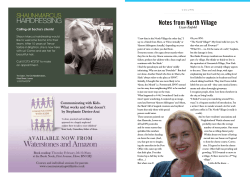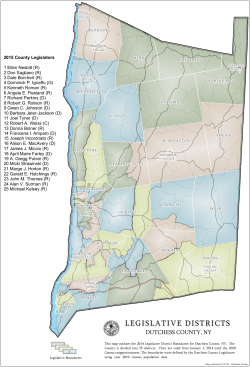
Sorcery Cases in Papua New Guinea`s Village Courts: Legal
Sorcery Cases in Papua New Guinea’s Village Courts: Legal Innovation Part IV MELISSA DEMIAN IN BRIEF 2015/27 This In Brief argues that the repeal of Papua New Guinea’s Sorcery Act 1971 has been functionally irrelevant for village courts, which face the issue of sorcery with far more frequency than higher courts ever did. The Sorcery Act, a piece of late colonialera legislation that was a half-hearted attempt to reflect the social milieu of Papua New Guinea, criminalised the use of sorcery for ‘evil purposes’. It was repealed in 2013 in the wake of several highprofile and gruesome killings related to sorcery accusations, because of a widespread perception that the Act could make available a defence in cases involving violence toward suspected sorcerers. Dissatisfaction with the Act had been building for some time, even though a sorcery-related defence has almost never succeeded in court (Demian 2011; Forsyth 2015). In addition to repealing the Act, Prime Minister Peter O’Neill introduced draconian penal measures such as the extension of the death penalty to sorcery-related murders (BBC News 2013). However timely the repeal of the Act may have been, in practical terms this event was largely symbolic. Cases involving sorcery infrequently make it to the national courts, where the repeal of this piece of legislation might actually constrain the options available to defendants who claim to have been provoked by the actions of sorcerers. The majority of sorcery cases, instead, are heard in village courts, particularly those in remote rural areas where concerns about sorcery are strongest, and are often a matter of nearly daily discussion. Village courts operate within the highly circumscribed parameters of the handbook and training workshops provided to magistrates. Training of magistrates can be patchy at best, and in some parts of the country appears not to have occurred for years. Additionally, magistrates themselves may have little or no formal education, as it was always the intention that village court magistrates should be local men — and these days, women — acknowledged by their communities to be persons of note and repositories of local or ‘customary’ knowledge. Formal advocacy is specifically excluded from village courts under the terms of the Village Courts Act 1989; these courts are forums in which grassroots people are meant to represent themselves, in line with the courts’ purpose of providing access to justice for all Papua New Guineans. So while village court magistrates make every effort to operate within the bounds of the law as they understand it, it is precisely this ‘as they understand it’ that is at issue. Their lines of communication with Port Moresby and even their own provincial capital may be shaky to non-existent, especially if they are not literate in English, and their grasp of the latest legislative decisions of parliament similarly tenuous. Awareness of the repeal of the Act in rural areas cannot, therefore, be taken for granted. More worryingly, in some cases where rural people are aware of the Act’s repeal, it has been interpreted as evidence that Port Moresby politicians have sided with the sorcerers. The danger here is that people will move their sorcery-related conflicts out of the village courts entirely, or else strike them from the court records, a practice established in some places well before the repeal of the Act (Goddard 1998). In such instances, the risk of sorcery accusations escalating into violent conflict is compounded. In my own region of expertise, Milne Bay Province, violence arising from sorcery cases is extremely rare. There are doubtless multiple reasons for this. They include the disinclination of Milne Bay people towards violent conflict generally, the dominance of older churches rather than evangelical Christian denominations which combine local sorcery discourses with global notions of a battle against satanic influence (Jorgensen 2005), and the effectiveness of village courts in dealing with sorcery accusations. But this effectiveness goes hand in hand with a pragmatic and fairly flexible interpretation of their jurisdiction. State, Society & Governance in Melanesia 1 ips.cap.anu.edu.au/ssgm State, Society & Governance in Melanesia • IN BRIEF SSGM Discussion Paper2015/27 2012/9 For example, the village courts on the southern coast of the province regularly levy compensation orders for sorcery cases in excess of the K1000 they are restricted to under the terms of the Village Courts Act. More critical at present is the matter of their hearing sorcery cases at all in the absence of any legislation to replace the Sorcery Act. But this is frankly irrelevant to the village courts, which must deal with the conflicts that are brought to them. They are technically permitted to deal with sorcery cases under the rubric of ‘customary law’, but the vagueness of this provision means that the way they handle such cases has been left entirely up to court officials to determine. Village court magistrates acknowledge without exception that sorcery cases are the most difficult ones they confront. Emotions run high, there are often one or more deaths in the background attributed to the act of sorcery, and the accused sorcerer will invariably deny having caused these deaths. Other sorcerers may be brought in as ‘expert witnesses’ to assess the evidence of the accusers and to interrogate the accused. A forensic history must be built up in which the presumed grievance of the accused sorcerer or his lineage against the lineage of the dead person(s) is brought to light. This process can last for upwards of 24 hours without interruption. Magistrates are concerned that the decisions they make at the conclusion of such cases, in a physically and mentally exhausted state, may not bring about the reconciliation that is their aim and indeed may rebound on themselves in the future. Whatever elites in Port Moresby or international observers may think about the issue of sorcery in Papua New Guinea, the sociological reality is that for most people in the country it is an abiding problem that must be dealt with somehow. Where sorcery accusations are concerned, village courts know they are charged with maintaining the civic good beloved of politicians and donor agencies alike, ‘law and order’, and some courts are willing to do so at the expense of certain jurisdictional The State, Society & Governance in Melanesia Program (SSGM) in the ANU College of Asia & the Pacific is a recognised leading centre for multidisciplinary research on contemporary Melanesia, Timor-Leste and the wider Pacific. limits. Court officials and other local leaders may decide to deal with sorcery-related cases outside the courts entirely, a move that can either facilitate the resolution of these cases or devolve into vigilante violence, depending on other factors at work in the conflict. The challenge, then, is to further solicit information from the village courts in how they can best be supported in dealing with sorcery cases. Greater support, in terms of both resourcing and adjudication guidance, could go some way towards closing the gap perceived by many rural people between their concerns and those of elites in Port Moresby. Author Notes Melissa Demian is a research fellow with SSGM. This In Brief draws on her fieldwork in Milne Bay and Port Moresby undertaken as part of the Legal Innovations in Papua New Guinea research project. She gratefully acknowledges input from Thomas Strong (National University of Ireland Maynooth) during the preparation of this In Brief. References BBC News 2013. PNG Repeals Sorcery Law and Expands Death Penalty. BBC News, 29 May. Demian, M. 2011. ‘Hybrid Custom’ and Legal Description in Papua New Guinea. In J. Edwards and M. PetrovicŠteger (eds). Recasting Anthropological Knowledge: Inspiration and Social Science. Cambridge: Cambridge University Press, 49–69. Forsyth, M. 2015. A Pluralist Response to the Regulation of Sorcery and Witchcraft in Melanesia. In M. Forsyth and R. Eves (eds). Talking it Through: Responses to Sorcery and Witchcraft Beliefs and Practices in Melanesia. Canberra: ANU Press, 213–39. Goddard, M. 1998. Off the Record: Village Court Praxis and the Politics of Settlement Life in Port Moresby, Papua New Guinea. Canberra Anthropology 21(1):41– 62. Jorgensen, D. 2005. Third Wave Evangelism and the Politics of the Global in Papua New Guinea: Spiritual Warfare and the Recreation of Place in Telefolmin. Oceania 75(4):444–61. E ssgm.admin@anu.edu.au @anussgm ips.cap.anu.edu.au/ssgm We acknowledge the Australian Government’s support for the production of In Brief. The of the ANU or the Australian Government. 2 views expressed in this paper are those of the author/s and do not necessarily reflect thoseState, Society & Governance See the SSGM website for a full disclaimer. in Melanesia
© Copyright 2025









